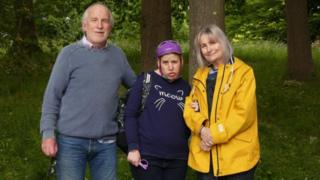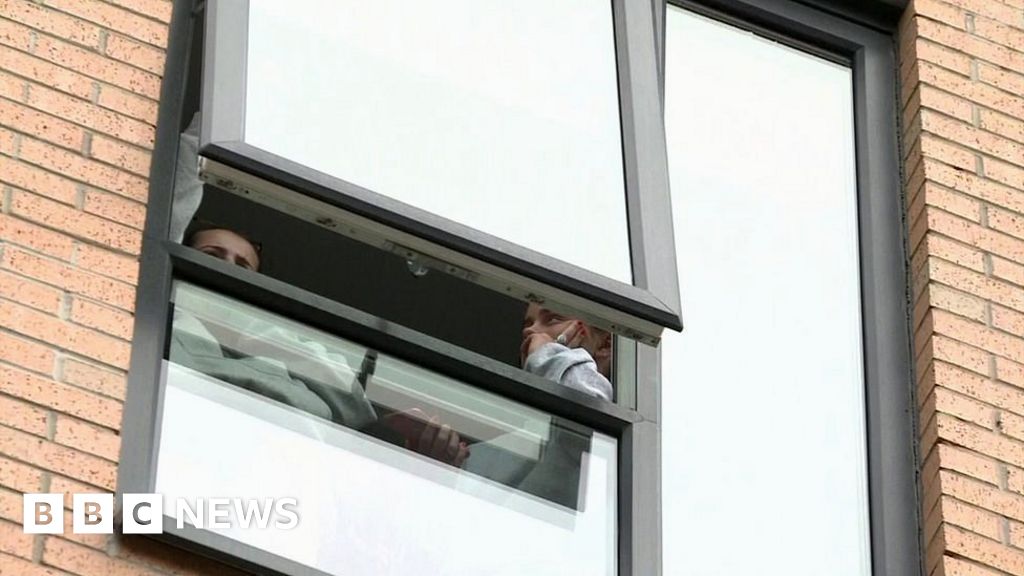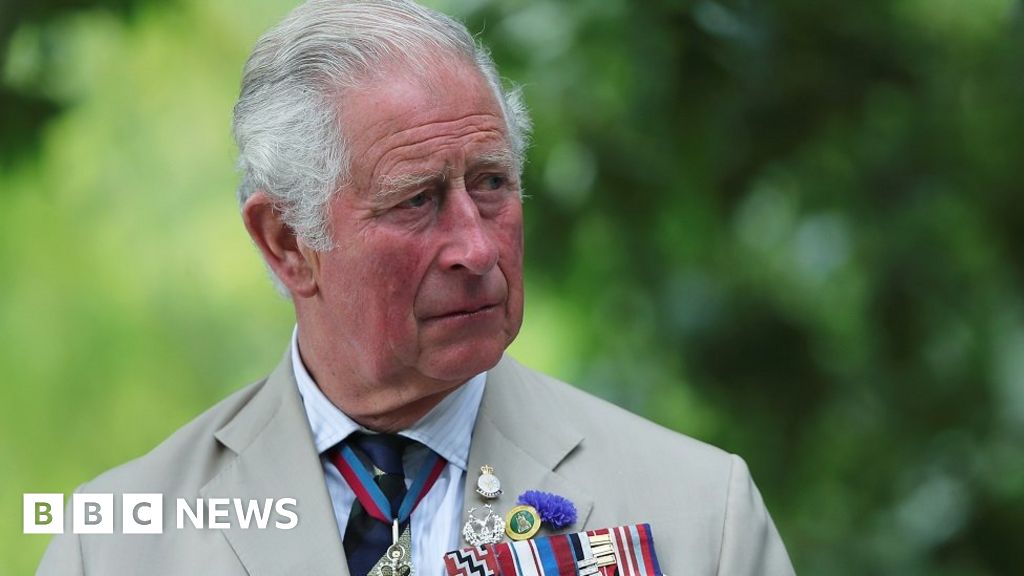 Image caption
The Fentons are among a growing number of older parents caring for adult children
Image caption
The Fentons are among a growing number of older parents caring for adult children
What's it like to get older but to still have to look after your child into their own adulthood?
And during the lockdown, how does it feel to provide round-the-clock care without any outside help?
"Nick and I looked at each other and said: 'We can't cope,'" said Jill Fenton, about her and her husband's "daily struggle" looking after their daughter with severe learning disabilities.
"Even saying that was really helpful, because it's hard to admit you can't cope. But there are times when you can't," said Jill, from Bromley in south London.
Jill and Nick's daughter Amy usually lives in residential care, but when the lockdown began she was visiting them at home. Without access to carers or family, they have looked after her entirely on their own ever since.
"It's just exhaustion," says Nick.
"I get so tired that even talking about it means there's a lump in my throat," says Jill.
Image caption Amy's parents look after her during the day and do their own work early in the morning"It's not that I want to cry, but it gets to you - and there are times when you do cry," she says.
When you hear about parents looking after their son or daughter with disabilities, the picture you might imagine is an adult caring for a child.
But, as with a growing number of families, the Fentons are an older couple looking after an adult with learning disabilities.
Amy is aged 39, even though she is as dependent as a toddler, and her parents are both aged 68.
Rachel Forrester-Jones, from the University of Bath, has researched the "looming crisis" of rising numbers of older carers needing support - and says the lockdown has intensified the pressures. These families are showing "mind-blowing resilience", says Prof Forrester-Jones who highlights parents who still tenaciously and lovingly look after their children into their 90s.
Although past retirement age, both Jill and Nick still have jobs which they have to balance alongside their care for Amy. The alternative to keeping her at home through the lockdown was for Amy to be cut off in residential care.
Image caption The routine of care includes administering Amy's medicationBut Amy has "severe memory problems" and the prospect of such prolonged separation "would be deeply upsetting for her", says her mother.
"We were told if she went back then we wouldn't be able to see her at all."
But it's a tough daily routine for her parents. Nick starts his own work from 05:00, so that he can help with Amy later, and the couple continue through to the early hours of the next morning. There is washing, showering and cleaning for Amy, helping her dress, feeding her, administering medication, watching over her to keep her safe, taking her up and down the stairs, making sure she's engaged and entertained and gets exercise.
She wears a helmet to protect her in case she falls, and she has been treated recently for a brain tumour.
Image copyright Alamy Image caption Jill and Amy taking a walk. But Jill describes the lack of help when Amy had a seizure in their local park"We're very tired, you know, we're older. We've got good health, but you do feel tired," said Jill.
She says people looking after disabled relatives can feel completely invisible in discussions about the lockdown.
"There's not enough public discussion or representation of families with disabled children," she says.
When they wanted some neighbourly support recently, they were literally overlooked.
Image caption Nick says he has come to realise how many families face their own problems and challenges"We were walking through our local park and she went down into a seizure - and both of us felt her going down and took the weight," says Jill. For 90 minutes they had to look after her there.
"We just had to sit down on the grass and hold her - and people were jogging, playing football, and nobody, not one person, asked if we were ok. I felt we were invisible. It was awful, but that's what it was like. If someone had said: 'Do you want me to stay with you?' - that would have really helped."
Nick says the relentlessness of care is exhausting but doesn't complain.
"'Why me?' is a wasted emotion. It is what it is - and you have to get on with it," he says.
Nick focuses on the practical problems, such as how parents can look after relatives like Amy in hospital, when they are put on adult wards.
"There is nobody there to speak for her. She can't speak for herself," says Jill.
Nick grew up with a brother with learning disabilities, and says in those days there was an element of taboo about having such a child.
Image caption Amy enjoying popping a plastic blister packHis parents were still looking after their son into their 80s. But there was no clear plan for what would happen when his parents died, and Nick was determined Amy would be settled somewhere by the time they could no longer look after her.
Prof Forrester-Jones says longer life expectancy for people with learning disabilities means many are still being looked after by parents when they are in their 50s and 60s. More than two-thirds of such adults are living with relatives, often parents.
During her research Prof Forrester-Jones came across a 93-year-old still looking after his son.
Many families only come to the attention of social services when there is a crisis, such as a parent dying or being too frail to continue, says Prof Forrester-Jones, director of the Centre for the Analysis of Social Policy at the University of Bath. Such parents never really get to retire, she says, and there are couples who "haven't been out together for a decade and never get a night off".
And hanging over them is the "psychological fear of the future". What will happen then they are no longer around to protect their child?
Image caption Amy is "someone you want to care for", says her motherThere is great poignancy and tenderness in such older parents looking after their vulnerable middle-aged children.
Jill says it's tough looking after her daughter but there is no resentment.
"It would be impossible to resent her. She's not an angel, and she presents huge behavioural challenges, but she is someone you want to care for."
Information and advice
If you or someone you know needs support with caring, these organisations offer advice and support.

 5 years ago
1013
5 years ago
1013 
